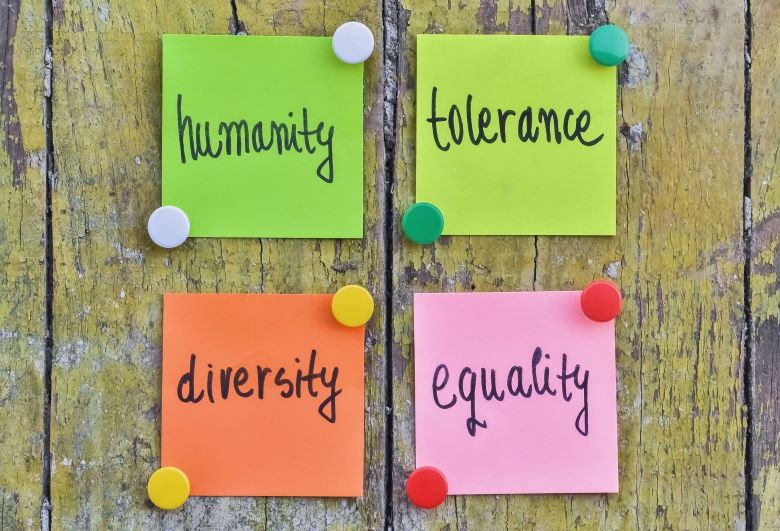7 ways to support black colleagues and mitigate racial bias
Listen, read, educate yourself, champion your colleagues of color, and call out blindspots about racism or inequality.

Editor’s note: We are re-running the top stories of 2020 as part of our year-end countdown.
What would you do if:
- You were in a meeting to discuss how to make your corporate magazine content more inclusive and the most senior person in the room – a white man – tells you he’s at risk of being a minority. Three of the seven people in the room are white men, and you’re the actual minority in the room.
- The owner of your company raises concerns with your team about cultural stereotyping in your content. Your manager responds, “The story is very popular.” He also adds that “The wording is factually correct.” So, the content remains unchanged.
- In preparation for your team’s away day, you’re asked to submit photos for the “Guess the Baby” game. You don’t submit a photo, as people will know it’s you because of your skin tone. No one mentions it to you on the day.
These are just a handful of demeaning and draining situations that I and other black communicators I know have faced in the workplace.
Racism has been a key theme of 2020 so far – be it racial inequalities exposed by the COVID-19 crisis or the seemingly endless cases of U.S. police brutality. But it’s nothing new.
What’s different this time is the public response. Global brands such as Netflix, Twitter and Spotify – and even the Chartered Institute of PR (CIPR) – have released statements condemning racism and showing support for black colleagues, members and customers.
The big question now is: Will this wave of change make it behind company doors? Experience suggests it won’t. Corporate Black History Month celebrations and social media shows of solidarity may be en vogue, but these well-meaning gestures rarely lead to meaningful change for employees.
It doesn’t have to be this way. We can make the workplace a more welcoming environment for black and brown colleagues—if we all do our part to learn, grow, speak up and fight for greater social equality.
Try these seven ways to help:
1. Listen to black people. Give us the room to share how we feel without judging, censoring or taking over. Here’s a helpful how-to-guide on effective listening, as well as tips on becoming a better workplace listener.
2. Ensure your communication outputs (internal or external) are inclusive. Here are five simple tips to get you started, and here are five steps toward creating a more inclusive culture.
3. Explore your biases, and fix them. Here are some handy resources collated by Harriet Smalls.
4. Expand your reading list. Check out:
- Black news outlets such as Black Ballad, The Voice Online, gal-dem, AZ Magazine, and The Root
- Black journalists and commentators such as Tobi Oredein, Nadine White, Chante Joseph, Genelle Aldred, Charlene White, Afua Hirsch
- Books on race and ethnicity such as “Why I’m No Longer Talking to White People About Race” by Rene Eddo-Lodge and “The Good Immigrant” by Nikesh Shukla
5. Donate money, time or resources to diversity and equality organizations. Check out:
- UKBLM
- Black Cultural Archives
- The Coalition of Race Equality Organisations (CORE)
- Runnymede
- BME PR Pros
6. Champion black colleagues and friends. Share our work. Recommend us for opportunities. Offer your skills, support, knowledge and contacts. (Here’s a simple example making the rounds on LinkedIn.)
7. Challenge people in your life who express racist views. It may not be comfortable, but challenging racist opinions or blindspots is the first step toward changing hearts and minds.
This is not an exhaustive list, and it doesn’t need to be. Just start with one thing. Pick one area you can focus on to start making the world a better, safer and more equitable place for everyone.
Annique Simpson is an internal communication pro based in London. A version of this post first appeared on her blog.








# 7: Challenge people in your life who express racist views. It may not be comfortable, but challenging racist opinions or blindspots is the first step toward changing hearts and minds.
—
QUESTION: What does a young white person do when they ….”Challenge people …. who express racist views.”? FOR EXAMPLE:
When a young white man challenged an older white male employee for making racist comments about the clients their company serves, the older employee reported the young guy to HR – saying the young guy made him feel “uncomfortable.”
Now HR has the young guy attending “sensitivity” classes!
What advice would you give to young employees, white or black, in this situation?